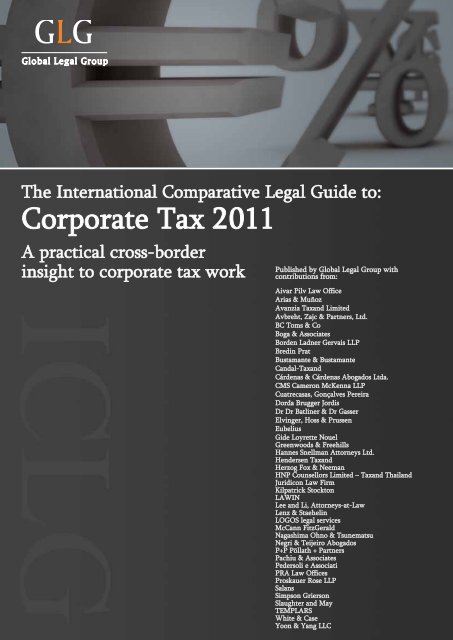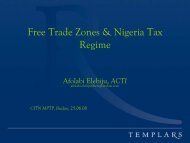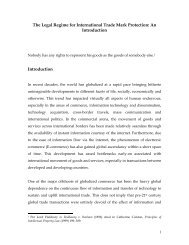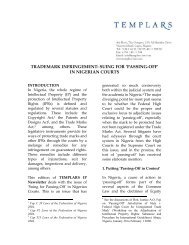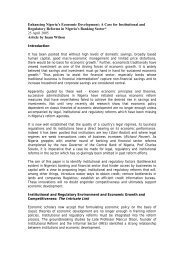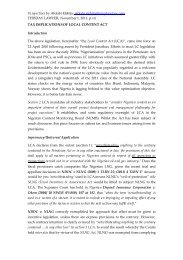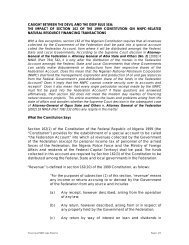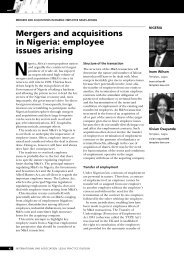Create successful ePaper yourself
Turn your PDF publications into a flip-book with our unique Google optimized e-Paper software.
The International Comparative Legal Guide to:<br />
<strong>Corporate</strong> <strong>Tax</strong> <strong>2011</strong><br />
A practical cross-border<br />
insight to corporate tax work<br />
Published by Global Legal Group with<br />
contributions from:<br />
Aivar Pilv <strong>Law</strong> Office<br />
Arias & Muñoz<br />
Avanzia <strong>Tax</strong>and Limited<br />
Avbreht, Zajc & Partners, Ltd.<br />
BC Toms & Co<br />
Boga & Associates<br />
Borden Ladner Gervais LLP<br />
Bredin Prat<br />
Bustamante & Bustamante<br />
Candal-<strong>Tax</strong>and<br />
Cárdenas & Cárdenas Abogados Ltda.<br />
CMS Cameron McKenna LLP<br />
Cuatrecasas, Gonçalves Pereira<br />
Dorda Brugger Jordis<br />
Dr Dr Batliner & Dr Gasser<br />
Elvinger, Hoss & Prussen<br />
Eubelius<br />
Gide Loyrette Nouel<br />
Greenwoods & Freehills<br />
Hannes Snellman Attorneys Ltd.<br />
Hendersen <strong>Tax</strong>and<br />
Herzog Fox & Neeman<br />
HNP Counsellors Limited – <strong>Tax</strong>and Thailand<br />
Juridicon <strong>Law</strong> <strong>Firm</strong><br />
Kilpatrick Stockton<br />
LAWIN<br />
Lee and Li, Attorneys-at-<strong>Law</strong><br />
Lenz & Staehelin<br />
LOGOS legal services<br />
McCann FitzGerald<br />
Nagashima Ohno & Tsunematsu<br />
Negri & Teijeiro Abogados<br />
P+P Pöllath + Partners<br />
Pachiu & Associates<br />
Pedersoli e Associati<br />
PRA <strong>Law</strong> Offices<br />
Proskauer Rose LLP<br />
Salans<br />
Simpson Grierson<br />
Slaughter and May<br />
TEMPLARS<br />
White & Case<br />
Yoon & Yang LLC
Chapter 36<br />
Nigeria<br />
Afolabi Elebiju<br />
TEMPLARS<br />
Vivian Osayande<br />
1 General: Treaties<br />
1.1 How many income tax treaties are currently in force in<br />
Nigeria?<br />
According to the Federal Inland Revenue Service (FIRS) website,<br />
Nigeria has tax treaties (TTs) with nine countries: Belgium, Canada,<br />
France, the Netherlands, Pakistan, Philippines, South Africa and the<br />
United Kingdom. Although the Companies Income <strong>Tax</strong> Act<br />
(CITA), 2004 LFN exhibits the Ministerial Orders for only 5<br />
treaties pursuant to section 45 of the CITA, in practice the FIRS<br />
generally regard other TTs (in so far as agreement has been signed<br />
on behalf of Nigeria) as effective. Thus TTs with China and the<br />
Czech and Slovak Republics are given effect to. It is unclear at the<br />
moment whether the appropriate Orders have been made by the<br />
Minister in respect of a number recent TTs, but UNCTAD’s Blue<br />
Book (July 2009) lists other countries such as Republic of Korea,<br />
Denmark, Norway, Poland and Sweden amongst those which have<br />
TTs with Nigeria.<br />
1.2 Do they generally follow the OECD or another model?<br />
Nigerian TTs follow both the OECD and the UN model, albeit the<br />
influence of the UN model is more pronounced. Also there are<br />
strains of ‘domestic models’ of Nigeria and her negotiating partners<br />
in the TTs.<br />
1.3 Do treaties have to be incorporated into domestic law<br />
before they take effect?<br />
The constitution requires treaties to be domesticated before they can<br />
take effect. However, as noted in question 1.1 above, the FIRS<br />
gives effect to TTs once they have been signed on behalf of Nigeria,<br />
including for example the Nigeria-China TT (reportedly signed in<br />
2002, but not on the FIRS website). This may also not be<br />
unconnected with historic FIRS practice (like many other agencies)<br />
of the commencing implementation of government policy<br />
initiatives/directives ahead of completion of the relevant formal<br />
framework. The issue of the constitutionality of section 45(1) of the<br />
CITA, pursuant to which certification by the minister that treaty<br />
arrangements have been made with the government of any country<br />
is sufficient to give the TT effect notwithstanding any provision of<br />
the CITA, has not been tested.<br />
1.4 Do they generally incorporate anti-treaty shopping rules<br />
(or “limitation of benefits” articles)?<br />
No they do not incorporate strict anti-treaty shopping rules.<br />
Generally, a resident of a State that is not a party to the double<br />
taxation treaty may establish an entity within a State that is a party<br />
to such a treaty and obtain the benefits therefrom. Examples of<br />
some restrictions on the enjoyment of treaty benefits is the ‘subject<br />
to tax’ requirement (Nigeria-UK TT) or ‘beneficial owner’ concept<br />
(Nigeria-Netherlands TT), whereby recipient enjoys a treaty rate<br />
only if subject to tax in the country of residence and not a proxy for<br />
the beneficial owner, respectively.<br />
1.5 Are treaties overridden by any rules of domestic law<br />
(whether existing when the treaty takes effect or<br />
introduced subsequently)?<br />
Where a treaty has been ratified, it would take precedence over any<br />
domestic law (except the constitution, which is Nigeria’s<br />
grundnorm) in case of any conflict.<br />
2 Transaction <strong>Tax</strong>es<br />
2.1 Are there any documentary taxes in Nigeria?<br />
Yes. Stamp duties are payable under the Stamp Duties Act (SDA).<br />
The Schedule to the SDA sets out the classification of instruments<br />
and the applicable rates – whether ad valorem or nominal (flat)<br />
rates, depending on the particular instrument. The current rate on<br />
share capital is 0.75%. It is possible to structure transactions to<br />
optimise the related stamp duty exposure. Failure to stamp<br />
documents that are liable to stamp duties does not render the<br />
documents void, but incapable of being tendered in evidence (in<br />
such event the documents can be tendered upon payment of stamp<br />
duties and any applicable penalties for failure to stamp in time).<br />
Accordingly, in practice parties may not stamp agreements between<br />
related companies as the prospect of dispute would be minimal.<br />
Conversely, the share transfers of unlisted companies are stamped<br />
as a necessary incidence of the prudent practice (but not legal<br />
requirement) of filing share transfers at the <strong>Corporate</strong> Affairs<br />
Commission (CAC), since the CAC would not accept unstamped<br />
documentation for filing.<br />
192<br />
WWW.ICLG.CO.UK<br />
ICLG TO: CORPORATE TAX <strong>2011</strong><br />
© Published and reproduced with kind permission by Global Legal Group Ltd, London
TEMPLARS<br />
Nigeria<br />
2.2 Do you have Value Added <strong>Tax</strong> (or a similar tax)? If so, at<br />
what rate or rates?<br />
Yes, Value Added <strong>Tax</strong> (VAT) is chargeable under the VAT Act at 5%<br />
of “the value of all taxable goods and services”. Newly-incorporated<br />
companies register for VAT simultaneously upon registration for CIT.<br />
There is pending litigation, instituted by Lagos State, at the Supreme<br />
Court on the constitutionality of the VAT Act, on the basis that in<br />
Nigeria’s federal system, State Governments, and not the Federal<br />
Government, should collect and administer sales taxes.<br />
2.3 Is VAT (or any similar tax) charged on all transactions or<br />
are there any relevant exclusions?<br />
VAT applies to the supply of goods (which includes any transaction<br />
where the whole or property in the goods is transferred or<br />
contemplated to be transferred) and the supply of services for a<br />
consideration. It has been argued that only exempt items listed in<br />
the 1 st Schedule to the VAT Act (including zero rated items in Part<br />
III of the 1 st Schedule, as amended by VAT Amendment Act No. 12<br />
2007), will not be subject to general VAT treatment. The VATexempt<br />
items are necessaries (such as basic food items, medical and<br />
pharmaceutical products and medical services) listed as a matter of<br />
policy or law (agricultural equipment, gas-related equipment, plant<br />
machinery or goods imported for use in export processing or free<br />
trade zones), and exported services. The FIRS maintains that<br />
services provided by a Nigerian resident to a non-resident client are<br />
not “exported services” for the purpose of the VAT Act.<br />
However, the argument has been made, equally convincingly, that<br />
choses in action (e.g. shares, licence interests) are not subject to<br />
VAT because they are neither “goods” nor “services”. This view<br />
has force because tax can not be imposed by implication, but can<br />
only be express words of the tax statute, which in any event must be<br />
construed in favour of the taxpayer and against the Revenue.<br />
Differences of opinion on this issue of whether VAT applies to<br />
choses in action between the FIRS and taxpayers will hopefully<br />
soon be the subject of judicial pronouncement.<br />
2.4 Is it always fully recoverable by all businesses? If not,<br />
what are the relevant restrictions?<br />
Under the VAT Act (section 17), input VAT paid by businesses on<br />
their purchases is recoverable from the output VAT charged on<br />
sales. However, only input VAT incurred on goods imported or<br />
purchased directly for the resale or goods, which form stock-intrade<br />
for the production of other goods on which VAT is charged,<br />
may be recovered from the output VAT. Accordingly, the input VAT<br />
incurred on services, overheads and general administration<br />
expenses can only be recovered through the profit and loss account.<br />
Input VAT incurred on capital expenditure must be capitalised with<br />
the cost of the asset in the balance sheet.<br />
2.5 Are there any other transaction taxes?<br />
Other transaction taxes include principally the following:<br />
(a) Capital gains, pursuant to the Capital Gains <strong>Tax</strong> Act (CGTA),<br />
which charges CGT on “…the gains accruing to any person on<br />
a disposal of assets”(section 1) at 10%. By section 6(1), there<br />
is a disposal of assets by a person “… where any capital sum<br />
is derived from a sale, lease, transfer, an assignment, a<br />
compulsory acquisition, or any other disposition of assets,<br />
notwithstanding that no asset is acquired by the person paying<br />
the capital sum”. “Capital Sum” is defined as any money or<br />
money’s worth which is not excluded from the consideration<br />
(b)<br />
(c)<br />
taken into account in the computation of the Capital Gain. The<br />
CGTA excludes “any money or money’s worth charged to<br />
income tax as income of, or taken into account as, a receipt in<br />
computing income or profits or gains or losses of the person<br />
making the disposal” for the purpose of the CIT. In practice,<br />
CGT is computed at 10% of the net gain (i.e. transfer proceeds<br />
less acquisition, historical costs such as enhancement of asset<br />
and transfer-related costs). By virtue of section 41 of the<br />
CGTA, CGT is subject to the terms of any applicable TTs. For<br />
a Nigerian resident, it is irrelevant that such asset is not<br />
situated in Nigeria; for a non-resident, CGT will only be levied<br />
on the amount received or brought into Nigeria.<br />
Property taxes, especially consent fees charged on the<br />
transfer of any interest in property pursuant to the Land Use<br />
Act. The rates vary from State to State and in Lagos State it<br />
is an average of 15% of the asset value or consideration.<br />
Federal rates (in respect of transactions in Federal land) tend<br />
to be lower.<br />
Perfection costs such as CAC filing fees on mortgages,<br />
charges and registration fees at Lands Registry etc. Land<br />
Use Charge (or its equivalent) is not a transaction tax from a<br />
strict point of view because it is not triggered by any<br />
transaction – liability arises by virtue of the property being in<br />
existence and in a location subject to jurisdiction of the<br />
enabling <strong>Law</strong>.<br />
2.6 Are there any other indirect taxes of which we should be<br />
aware?<br />
Yes there are, and some of these are excise duties, import duties and<br />
export duties. Import duties are assessed using the ECOWAS<br />
Common External Tariff (CET) and the Comprehensive Import<br />
Supervision Scheme (CISS), with an administrative charge of 1% of<br />
F.O.B; the value of the imports. Other charges are: 7% surcharge<br />
calculated on the customs duty; 0.5% trade liberalisation scheme levy<br />
(on customs duty from non-ECOWAS countries); VAT at 5% on the<br />
CIF value of imports, customs duty and the allied charges mentioned<br />
above; and other applicable levies, for example port surcharges.<br />
3 Cross-border Payments<br />
3.1 Is any withholding tax imposed on dividends paid by a<br />
locally resident company to a non-resident?<br />
Yes. Withholding tax (WHT) applies at 10% or 7.5% if the<br />
shareholder is resident in a country which has TTs with Nigeria. In<br />
either case, the WHT is the final tax on such dividend for the nonresident.<br />
Pursuant to section 23 of the CITA, a dividend received<br />
from investments in wholly export-oriented businesses is tax<br />
exempt and therefore would not be subject to WHT.<br />
3.2 Would there be any withholding tax on royalties paid by a<br />
local company to a non-resident?<br />
Yes, at the rate of 10% (non-resident individuals 5%). Nigeria TTs<br />
also have beneficial provisions on royalties. WHT deducted on<br />
royalties and interest is the final tax on such income for nonresidents.<br />
3.3 Would there be any withholding tax on interest paid by a<br />
local company to a non-resident?<br />
WHT is applicable at 10% or 7.5% if a non-resident lender is based<br />
in a TT country. However, foreign loans could qualify for full or<br />
Nigeria<br />
ICLG TO: CORPORATE TAX <strong>2011</strong><br />
© Published and reproduced with kind permission by Global Legal Group Ltd, London<br />
WWW.ICLG.CO.UK<br />
193
TEMPLARS<br />
Nigeria<br />
Nigeria<br />
partial WHT exemption based on tenor – including a moratorium<br />
and grace period, pursuant to the 3 rd Schedule of the CITA; loans<br />
with a 7 year + tenor enjoy 100% exemption. The moratorium<br />
period (payment of only the interest but not the principal) could be<br />
zero, but there must be a grace period (during which neither interest<br />
nor principal is payable, although interest accrues). Accelerated<br />
repayment results in loss of the (full) exemption or triggers<br />
graduated exemption depending on timing.<br />
3.4 Would relief for interest so paid be restricted by reference<br />
to “thin capitalisation” rules?<br />
No, there are generally no thin capitalisation rules; interest is<br />
allowed as a deductible expense. However the FIRS would be<br />
interested in the competitiveness of the interest rates, and could<br />
adjust the transaction to impose a “realistic” or “arm’s length”<br />
commercial interest rate and tax the borrower’s profits accordingly,<br />
if they are of the view that the interest is excessive, especially in<br />
related parties’ context. On the other hand, the FIRS does not query<br />
interest free loans or concessionary interest rates from foreign<br />
lenders to Nigerian companies, since this results in higher taxable<br />
profits for the Nigerian company, which is taxable at 30%, rather<br />
than the 10% WHT to be withheld on the interest income.<br />
3.5 If so, is there a “safe harbour” by reference to which tax<br />
relief is assured?<br />
The only “safe harbour” is that the interest was incurred in order to<br />
generate income (i.e. it was an expenditure incurred “wholly,<br />
exclusively, necessarily and reasonably” for that purpose), and the<br />
same is deductible.<br />
a deductible expense. However, it is generally possible to achieve<br />
reasonable transfer pricing objectives with appropriate structuring<br />
of contracts.<br />
4 <strong>Tax</strong> on Business Operations: General<br />
4.1 What is the headline rate of tax on corporate profits?<br />
CIT is charged on corporate profits accruing in, derived from,<br />
brought into or received in Nigeria at 30%. Nigerian companies are<br />
also liable to education tax at 2% of their assessable profits. The<br />
education tax is deductible for CIT purposes.<br />
4.2 When is that tax generally payable?<br />
Generally it is payable within 6 months from the end of the<br />
accounting year when self-assessment returns are filed, and<br />
accompanied at least by instalment payments of the tax due (unless<br />
the company is in a refund position, for example by reason of<br />
excess withholding tax credits).<br />
Eligible companies may enjoy tax incentives, including tax<br />
holidays pursuant to the CITA (section 39 on downstream gas<br />
utilisation) or the Industrial Development (Income <strong>Tax</strong> Relief) Act<br />
(for “pioneer” companies), which includes the solid minerals sector.<br />
Companies in export processing or free trade zones are exempt<br />
from all Federal, State, LG taxes, levies and rates, to the extent that<br />
100% of their production is for export, otherwise tax accrues<br />
proportionately on the profits. This, however, does not relieve them<br />
of reporting requirements to regulatory agencies within the Zones.<br />
194<br />
3.6 Would any such “thin capitalisation” rules extend to debt<br />
advanced by a third party but guaranteed by a parent<br />
company?<br />
See questions 3.4 and 3.5 above. Thin capitalisation is relevant for<br />
financial institutions (especially banks), which have strict capital<br />
adequacy requirements, but these are not tax-driven, but sectorregulated.<br />
3.7 Are there any restrictions on tax relief for interest<br />
payments by a local company to a non-resident in<br />
addition to any thin capitalisation rules mentioned in<br />
questions 3.4-3.6 above?<br />
None – if the expense meets the “wholly, exclusively, necessarily<br />
and reasonably” test of section 24 of the CITA and the interest rate<br />
is competitive.<br />
3.8 Does Nigeria have transfer pricing rules?<br />
Yes, the general anti-avoidance provision of section 22 of the CITA<br />
empowers the FIRS to adjust transactions (especially between<br />
related parties) that it considers artificial or fictious, being entered<br />
into for the primary purpose of reducing tax that would have been<br />
otherwise due, and tax the same accordingly. Pursuant to the<br />
National Office for Technology Acquisition and Promotion<br />
(NOTAP) Act, NOTAP regulates technology payments by Nigerian<br />
beneficiaries to non-resident service providers or licensors of<br />
intellectual property, with a view to checking transfer pricing<br />
abuses. On this basis, fees paid under registrable but unregistered<br />
service agreements with NOTAP may be disallowed by the FIRS as<br />
4.3 What is the tax base for that tax (profits pursuant to<br />
commercial accounts subject to adjustments; other tax<br />
base)?<br />
<strong>Tax</strong> is assessed on total profits pursuant to audited accounts which<br />
are subject to adjustments. Provisions on the payment of minimum<br />
tax may be triggered, but this does not apply to Nigerian companies<br />
which have at least 25% foreign participation, carrying on<br />
agricultural trade or business within the first four years of the<br />
commencement of business (section 33 of the CITA). Sections 19<br />
and 20 of the CITA provide for excess dividend tax, whereby if in<br />
any year the amount of dividends paid exceed the tax payable or the<br />
tax is not payable at all (for example, if dividend is being paid out<br />
of retained earnings), then the company paying the dividend shall<br />
pay CIT on the amount of the dividend “as if the dividend is the<br />
total profits of the company for the year of assessment to which the<br />
accounts, out of which the dividend is declared, relates”. There are<br />
creative opportunities and sustainable arguments to manage this<br />
exposure. Also, section 21 of the CITA stipulates that undistributed<br />
profits of a closely-held company of less than five shareholders may<br />
be treated as distributed for the purpose of taxing the deemed<br />
distribution in the hands of the shareholders through WHT.<br />
4.4 If it otherwise differs from the profit shown in commercial<br />
accounts, what are the main other differences?<br />
None – save for observations above.<br />
4.5 Are there any tax grouping rules? Do these allow for<br />
relief in Nigeria for losses of overseas subsidiaries?<br />
Group tax relief is not allowed in any shape or form in Nigeria –<br />
WWW.ICLG.CO.UK<br />
ICLG TO: CORPORATE TAX <strong>2011</strong><br />
© Published and reproduced with kind permission by Global Legal Group Ltd, London
TEMPLARS<br />
Nigeria<br />
each company is treated as a separate taxable entity. On the basis of<br />
the “wholly, exclusively, necessarily and reasonably incurred”<br />
expense deductibility test in section 24 of the CITA, losses of<br />
overseas subsidiaries should be allowed to reduce the taxable profits<br />
of the Nigerian parent, particularly as such investment income would<br />
have been taxable when brought into Nigeria, but for the specific<br />
exemption in, and upon compliance with, section 23(1)(k) of the<br />
CITA. However, the foregoing would also be subject to the<br />
qualification that the CITA precludes loss from one trade/business<br />
being offset against income from another trade or business.<br />
4.6 Is tax imposed at a different rate upon distributed, as<br />
opposed to retained, profits?<br />
Generally, no. However, by section 21 of the CITA, where small<br />
closely-held companies that have distributable profits (which could be<br />
declared as dividends) fail to do so, the FIRS could deem the<br />
dividends as distributed for the purpose of enforcing payment of WHT<br />
on the deemed distribution from the company. This provision does not<br />
apply to companies which have more than 5 shareholders.<br />
4.7 What other national taxes (excluding those dealt with in<br />
“Transaction <strong>Tax</strong>es”, above) are there - e.g. property<br />
taxes, etc.?<br />
There is the Education <strong>Tax</strong> which is charged at 2% of assessable<br />
profits and is imposed on all companies incorporated in Nigeria.<br />
Sectoral taxes, for example the NITDA Levy (1% of profit before<br />
tax), is payable to FIRS by operators in the telecoms/IT industry, and<br />
financial institutions including pension operators, etc., with an annual<br />
turnover of N100 million and above. The Industrial Training Fund<br />
(ITF) Act requires every employer, who has 25 or more employees,<br />
to contribute 1% of annual payroll costs to the ITF; however, the ITF<br />
may grant up to a 60% refund of an employer’s contribution if such<br />
employer satisfies the ITF in respect of the adequacy of its employee<br />
training programme in any particular year.<br />
4.8 Are there any local taxes not dealt with in answers to<br />
other questions?<br />
There are several other taxes, fees and levies which varies from<br />
State to State and local government (county) to local government.<br />
The <strong>Tax</strong>es & Levies (Approved List for Collection) Act sets out the<br />
list. It is to be noted that State Houses of Assembly, ostensibly<br />
relying on constitutional provisions they argue enable them in that<br />
behalf, have legislated for additional taxes collectible by their State<br />
or local governments. The wider constitutional issue of whether the<br />
Act (a federal legislation) could limit taxes collectible by State and<br />
local governments is yet to be decisively determined, although there<br />
have been decisions, such as Eti-Osa Local Government v. Rufus<br />
Jegede & Anor. (2007) 5 CLRN 67 (Court of Appeal), which held<br />
that particular levies were invalid as they were inconsistent with the<br />
Act.<br />
5 Capital Gains<br />
5.1 Is there a special set of rules for taxing capital gains and<br />
losses?<br />
Yes, these rules are contained in the CGTA. The basis of<br />
computation is that of net gain - by deducting from the sum<br />
received or the receivable person realising the chargeable gain, the<br />
cost of acquisition to the plus expenditure incurred on the<br />
improvement or expenses incidental to the realisation of the asset.<br />
5.2 If so, is the rate of tax imposed upon capital gains<br />
different from the rate imposed upon business profits?<br />
Yes it is. The rate for capital gains is 10%, while that of business<br />
profits is 30%.<br />
5.3 Is there a participation exemption?<br />
Sections 30 and 32 of the CGTA exempts gains from the transfer of<br />
shares arising from mergers, acquisitions or other forms of business<br />
combinations from the CGT. Gains accruing to holders of unit trusts<br />
are also exempt provided the proceeds are re-invested (section 33).<br />
Ecclesiastical, charitable or educational institutions and statutory and<br />
diplomatic bodies are exempt. Also the transfer of assets from trustees<br />
to beneficiaries will not attract CGT. Other exemptions include: gains<br />
made upon a disposal of business assets where the proceeds are spent<br />
in acquiring new business assets; and gains made upon the disposal of<br />
an interest in the rights under any policy of an assurance or contract<br />
for a differed annuity on the life of any person.<br />
5.4 Is there any special relief for reinvestment?<br />
Yes. In addition to section 33 on the exemption of proceeds of unit<br />
trust in question 5.3 above, under section 32(1) of the CGTA, where<br />
businessmen or traders sell assets of old businesses and use the<br />
proceeds to procure new and similar business assets, then no gain<br />
will be said to have occurred.<br />
6 Branch or Subsidiary?<br />
6.1 What taxes (e.g. capital duty) would be imposed upon the<br />
formation of a subsidiary?<br />
During incorporation, stamp duty is charged at 0.75% of the<br />
companies share capital. Stamp duty will also apply if the share<br />
capital of the subsidiary is to be increased post-incorporation.<br />
6.2 Are there any other significant taxes or fees that would be<br />
incurred by a locally formed subsidiary but not by a<br />
branch of a non-resident company?<br />
None; in any event branch registration is not permitted in Nigeria,<br />
as section 54 of the Companies and Allied Matters Act (CAMA)<br />
requires foreign companies to incorporate Nigerian subsidiaries in<br />
order to do business in Nigeria. Although there is provision for<br />
exemption from incorporation pursuant to section 56 of the CAMA,<br />
that procedure, given its cumbersome nature, is rarely invoked.<br />
6.3 How would the taxable profits of a local branch be<br />
determined?<br />
Not applicable. Nigerian tax rules do not distinguish between local<br />
branches and Nigerian subsidiaries – the rules are applied to taxable<br />
income in the same manner. As a matter of practice, historically (to<br />
overcome associated logistical challenges, etc.) the FIRS assesses<br />
non-resident companies to tax, using a deemed profit rate of 20%,<br />
which, given the 30% CIT rate, effectively translates into 6% of<br />
turnover. Such non-residents would prefer high margin projects to be<br />
Nigeria<br />
ICLG TO: CORPORATE TAX <strong>2011</strong><br />
© Published and reproduced with kind permission by Global Legal Group Ltd, London<br />
WWW.ICLG.CO.UK<br />
195
TEMPLARS<br />
Nigeria<br />
Nigeria<br />
taxed on a deemed basis, but low margin ones on actual figures. This<br />
is in contrast to residents which are only taxed on the basis of their<br />
audited accounts. The FIRS is however moving away from using<br />
deemed profit and instead insisting on taxation based on actual figures.<br />
6.4 Would such a branch be subject to a branch profits tax (or<br />
other tax limited to branches of non-resident companies)?<br />
No it would not.<br />
6.5 Would a branch benefit from tax treaty provisions, or<br />
some of them?<br />
Every Nigerian or non-resident company will benefit from<br />
applicable treaty provisions.<br />
6.6 Would any withholding tax or other tax be imposed as the<br />
result of a remittance of profits by the branch?<br />
Any profits to be remitted to the non-resident would be regarded as<br />
dividends and subject to WHT at 10% or 7.5%, if based in a treaty<br />
country.<br />
7 Anti-avoidance<br />
7.1 How does Nigeria address the issue of preventing tax<br />
avoidance? For example, is there a general antiavoidance<br />
rule or a disclosure rule imposing a<br />
requirement to disclose avoidance schemes in advance of<br />
the company’s tax return being submitted?<br />
The general anti-avoidance provision is to be found in section 22 of<br />
the CITA (and also section 20 of the CGTA), giving FIRS the power<br />
to adjust transactions that it considers artificial or fictitious.<br />
Specific anti-avoidance provisions include sections 19, 20 and 21 of<br />
the CITA on excess dividend tax and deemed distribution<br />
respectively (see question 4.3 above). In respect of CGT, antiavoidance<br />
provisions target bargains comprising two or more<br />
transactions and transactions between “connected persons”<br />
(sections 19 and 22). There is no general anti-avoidance rule or<br />
disclosure rules’ imposing a requirement to disclose avoidance<br />
schemes. The FIRS uses its audit powers to review transactions and<br />
may issue additional assessments or take other necessary action as<br />
it deems fit.<br />
Afolabi Elebiju<br />
TEMPLARS<br />
13A, A.J. Marinho Drive<br />
Victoria Island, Lagos<br />
Nigeria<br />
Tel: +234 1 4611 290 93<br />
Fax: +234 1 4611 294<br />
Email: afolabi.elebiju@templars-law.com<br />
URL: www.templars-law.com<br />
Afolabi Elebiju, LLM (Harvard), Fellow, Chartered Institute of<br />
<strong>Tax</strong>ation of Nigeria (FCTI), is a Partner, the tax team and M&A<br />
leader at <strong>Templars</strong>, a leading full service commercial law firm in<br />
Nigeria. He was previously Senior Manager, <strong>Tax</strong> & Regulatory<br />
Services at KPMG Professional Services, where amongst others,<br />
he focused on optimal tax and regulatory structuring of several<br />
landmark transactions across all sectors, particularly foreign<br />
investments. A participant at the inaugural KPMG’s African <strong>Tax</strong><br />
Academy, he is a member of CITN’s Indirect <strong>Tax</strong> Faculty, and<br />
facilitates at CITN training programmes. He recently spoke on<br />
Free Trade Zones & Nigeria <strong>Tax</strong> Regime and <strong>Tax</strong> Issues in Trusts<br />
& Estates. Afolabi contributes a tax focused column,<br />
<strong>Tax</strong>spectives to THISDAY <strong>Law</strong>yer, the legal section of leading<br />
Nigerian daily, THISDAY newspapers. Afolabi’s numerous<br />
publications (articles, case reviews, book reviews) on energy,<br />
corporate, commercial and tax law issues have appeared in<br />
prestigious international legal journals.<br />
Vivian Osayande<br />
TEMPLARS<br />
13A, A.J. Marinho Drive<br />
Victoria Island, Lagos<br />
Nigeria<br />
Tel: +234 8 3405 4846, 4611 889 90<br />
Fax: +234 1 4611 294<br />
Email: vivian.osayande@templars-law.com<br />
URL: www.templars-law.com<br />
Vivian Osayande advises multinational corporations and other<br />
entities on matters involving taxation and transaction structures.<br />
Vivian possesses a deep understanding of legal and fiscal<br />
systems. Recently, Vivian advised BJ Services on the Nigerian<br />
tax and regulatory aspects of its $US5.5 billion dollar acquisition<br />
by Baker Hughes, assisting with the structure of the employee<br />
remuneration and other end of service benefits with a view to<br />
achieving optimum tax advantage on the transaction.<br />
Vivian, a Senior Associate at <strong>Templars</strong> and a core member of the<br />
firm’s <strong>Tax</strong> and <strong>Corporate</strong> Commercial Practice Groups, graduated<br />
from Ambrose Ali University and was admitted to the Nigerian Bar in<br />
2004. Vivian is a member of the US-based National Employment<br />
<strong>Law</strong>yers Council and is also a member of the Chartered Institute of<br />
Arbitrators as well as the Nigerian Industrial Relations Association.<br />
Vivian has several published articles to her credit and she is also a<br />
sought-after conference speaker.<br />
TEMPLARS is a leading full service commercial law firm in Nigeria, with the know-how to provide innovative commercial solutions<br />
for clients with diverse needs. With over 40 lawyers and 12 partners working out of offices in Lagos, Abuja, Port Harcourt and<br />
Uyo, <strong>Templars</strong> is strategically placed to offer quality legal services to clients in Nigeria’s major economic hubs. We are organised<br />
into <strong>Corporate</strong> Commercial, Energy & Projects, Finance and Dispute Resolution Practice Groups. The <strong>Tax</strong> practice straddles all<br />
the Groups and has been involved with transaction advisory, structuring, compliance, tax litigation and investment arbitration.<br />
At <strong>Templars</strong>, we pride ourselves on our multi-specialist strengths in diverse areas of the law and a can-do, collaborative mindset<br />
in helping clients achieve their business goals. We have a reputation for understanding our clients’ operating industries and the<br />
core of our expertise is demonstrated by our comprehensive and practical approach in addressing individual client’s needs.<br />
196<br />
WWW.ICLG.CO.UK<br />
ICLG TO: CORPORATE TAX <strong>2011</strong><br />
© Published and reproduced with kind permission by Global Legal Group Ltd, London
The International Comparative Legal Guide to:<br />
<strong>Corporate</strong> <strong>Tax</strong> <strong>2011</strong><br />
Other titles in the ICLG series include:<br />
Business Crime<br />
Cartels & Leniency<br />
Class Actions<br />
Commodities and Trade <strong>Law</strong><br />
Competition Litigation<br />
<strong>Corporate</strong> Governance<br />
<strong>Corporate</strong> Recovery & Insolvency<br />
Dominance<br />
Employment <strong>Law</strong><br />
Enforcement of Competition <strong>Law</strong><br />
Environment <strong>Law</strong><br />
Gas Regulation<br />
International Arbitration<br />
Litigation & Dispute Resolution<br />
Merger Control<br />
Mergers & Acquisitions<br />
Patents<br />
PFI / PPP Projects<br />
Pharmaceutical Advertising<br />
Product Liability<br />
Public Procurement<br />
Real Estate<br />
Securitisation<br />
Telecommunication <strong>Law</strong>s and Regulations<br />
To order a copy of a publication, please contact:<br />
Global Legal Group<br />
59 Tanner Street<br />
London SE1 3PL<br />
United Kingdom<br />
Tel: +44 20 7367 0720<br />
Fax: +44 20 7407 5255<br />
Email: sales@glgroup.co.uk<br />
www.ICLG.co.uk


